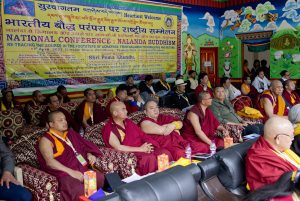Even as India and China continue to be locked in a military standoff along the Line of Actual Control (LAC) in Ladakh, the two countries are grappling for influence over the Buddhist world.
This week saw India using its strong ties with Buddhism not only to expand its influence over Buddhist monks and scholars worldwide but also, to reaffirm and assert its sovereign rights over Arunachal Pradesh, a state in India’s Northeast where China lays claim to some 90,000 sq km of territory.
On April 17, the Indian Himalayan Council of Nalanda Buddhist Tradition hosted a major Buddhist conference at Zemithang in Arunachal Pradesh. Some 600 Buddhist monks and scholars including Tibetan Buddhism spiritual leaders from across India attended the event.
Visits by Indian leaders and the Dalai Lama to Arunachal Pradesh as well as important global events that India hosts here have never failed to draw Beijing’s ire. It is likely that the conference at Zemithang would have been closely watched by an annoyed Beijing.
Located in Arunachal’s Tawang district, Zemithang borders the Tibetan Autonomous Region. It holds enormous significance not just in contemporary Tibetan history but in India’s relationship with Tibetans.
It was at Zemithang that the 14th Dalai Lama made his first stop on entering India on March 31, 1959, after escaping Chinese repression in Tibet. Since then, the Tibetan spiritual leader and around 100,000 Tibetans have been living in exile in India. It is at Dharamsala in India that the headquarters of the Tibetan government in exile is located.
The significance of the venue of the meeting would have been noted by the Buddhist scholars participating in the event and of course, by Beijing.
Barely had the dust kicked up by the Arunachal event settled before India hosts another global Buddhist event, this one in New Delhi.
Over 170 delegates, including monks, scholars, and representatives of Buddhist organizations from 30 countries, as well as around 150 Indian delegates will participate in the Global Buddhist Summit (GBS) in the Indian capital on April 20 and 21. The GBS is being hosted by the Indian government and the International Buddhist Confederation (IBC), which falls under the Ministry of Culture.
China will be a notable absentee. “Chinese are not coming. Invitations were sent… ” IBC Director-General Abhijit Halder told the media on Monday. There will be two participants from Taiwan at the Delhi event. The Dalai Lama, who is at the center of a controversy over his alleged inappropriate behavior with a young boy, may not participate in the meeting due to “health issues,” Halder said on Monday.
Global conferences on Buddhism and other events in India, particularly those in which the Dalai Lama participates, routinely draw Beijing’s ire. The Tibetan spiritual leader was invited to deliver the keynote address at a 2011 GBC event to mark the 2600th anniversary of Buddha’s enlightenment. China objected to his participation but the event, which saw the participation of 900 Buddhist scholars from 46 countries went ahead as planned.
A furious Chinese government hit back. It postponed Sino-Indian border talks between special representatives of the two sides.
As important as their fight over territory is the India-China contest for leadership of the Buddhist world. Both countries draw on their ties with Buddhism.
Although Siddhartha Gautama, the founder of Buddhism was born in Lumbini in present-day Nepal, all the important events in his life relating to Buddhism such as his enlightenment, first sermon and ‘nirvana’ happened in India. India, therefore, sees itself as the birthplace or cradle of Buddhism.
China on the other hand likes to project its role in Buddhism’s revival. When Buddhism declined in India from around the 5th-6th centuries CE and all but disappeared in the land of its birth, it was in China that it secured a fresh lease of life.
Today, China and India draw on their Buddhist heritage as a soft power resource to reach out to Buddhist societies worldwide. They send Buddhist relics such as the Buddha’s teeth or fragments of bone for display in Buddhist countries. They fund the construction of Buddha statues and shrines there and provide scholarships for Buddhist studies. Buddhism is an important component of their diplomatic outreach in Asia.
China showcases its support for Buddhism abroad to negate global perceptions of its role in the destruction of Tibetan Buddhism. Like India, China hosts global Buddhist meetings. Its World Buddhist Forum events draw monks and scholars from several countries. These meetings are jointly hosted by cities in China and Taiwan or Hong Kong, for instance.
Like India, China’s motivations in hosting global Buddhist conferences are driven by the Tibet question. It is keen to ensure that Buddhists across the world will endorse its choice of a successor to the current Dalai Lama. Hence its assiduous courting of Buddhist monks and organizations worldwide through hosting conferences and funding activities. It has used WBF events to promote and project its appointee, Gyaltsen Norbu, as the Panchen Lama, the second-ranking figure in Tibetan Buddhism.
Given its deep antipathy to the Dalai Lama, China has never invited him to WBF meetings.
Should the Tibetan leader stay away from the IBC meeting in Delhi – he is scheduled to speak on the second day of the two-day event — Beijing will be relieved.
All eyes will be on the New Delhi meeting on Friday. Will the Dalai Lama attend?













